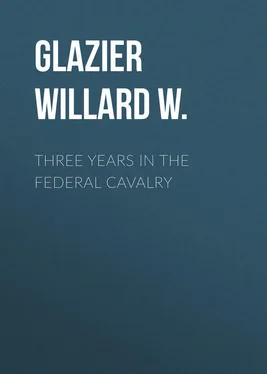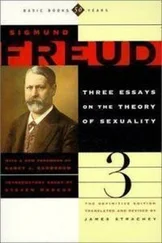Willard Glazier - Three Years in the Federal Cavalry
Здесь есть возможность читать онлайн «Willard Glazier - Three Years in the Federal Cavalry» — ознакомительный отрывок электронной книги совершенно бесплатно, а после прочтения отрывка купить полную версию. В некоторых случаях можно слушать аудио, скачать через торрент в формате fb2 и присутствует краткое содержание. Жанр: История, foreign_antique, foreign_prose, short_story, на английском языке. Описание произведения, (предисловие) а так же отзывы посетителей доступны на портале библиотеки ЛибКат.
- Название:Three Years in the Federal Cavalry
- Автор:
- Жанр:
- Год:неизвестен
- ISBN:нет данных
- Рейтинг книги:4 / 5. Голосов: 1
-
Избранное:Добавить в избранное
- Отзывы:
-
Ваша оценка:
- 80
- 1
- 2
- 3
- 4
- 5
Three Years in the Federal Cavalry: краткое содержание, описание и аннотация
Предлагаем к чтению аннотацию, описание, краткое содержание или предисловие (зависит от того, что написал сам автор книги «Three Years in the Federal Cavalry»). Если вы не нашли необходимую информацию о книге — напишите в комментариях, мы постараемся отыскать её.
Three Years in the Federal Cavalry — читать онлайн ознакомительный отрывок
Ниже представлен текст книги, разбитый по страницам. Система сохранения места последней прочитанной страницы, позволяет с удобством читать онлайн бесплатно книгу «Three Years in the Federal Cavalry», без необходимости каждый раз заново искать на чём Вы остановились. Поставьте закладку, и сможете в любой момент перейти на страницу, на которой закончили чтение.
Интервал:
Закладка:
Our scouting is on a limited scale, though it affords considerable exercise and excitement. Thereby we are learning the topography of the country, and making small maps of the same. We are traversing the forests, through the wood-roads and by-paths which run in every direction; strolling by the streams and ravines, and gaining all the information which can be of use to us in future manœuvrings. We scout in small squads over the entire area occupied by our forces, and often beyond; and, now and then, more frequently in the night, we patrol between our picket posts, to ascertain that all is well at the points most exposed to danger. The principal object of scouting is to learn the strength and position of the enemy, while the object of patrolling is to learn our own.
October 20. – To-day the regiment was honored by a visit from its patron, Senator Ira Harris. After witnessing a mounted drill and parade, which pleased him much, he presented us a beautiful stand of colors, accompanied by an appropriate and eloquent address. He made especial reference to the object of the organization, the hopes of its friends, and their earnest prayers for its future usefulness and success. He dwelt enthusiastically upon the work before us. At the close of the speech the command responded with a rousing round of cheers, expressive of their thankfulness for the banner and of their determination to keep it, to stand by it, and to defend it even with their lives. The occasion was one to be remembered.
Another great pall of sadness has fallen upon our soldiers. The papers bring intelligence of our terrible disaster at Ball's Bluff, and the promising Colonel E. D. Baker has fallen, while gallantly leading his noble Californians. Discussions as to the cause or causes of that fatal advance and bloody retreat are going on throughout our camps. It does seem to many as though gross incompetency or treachery must have influenced the authorities having immediate oversight of the affair, and that our fallen braves have been needlessly immolated upon their country's altar.
"Big Bethel, Bull Run, and Ball's Bluff,
Oh, alliteration of blunders!
Of blunders more than enough,
In a time full of blunders and wonders."
But the boys are enthusiastic over the bravery of our nineteen hundred, who fought against a force more than twice their number, with all the advantage of position and knowledge of the country. All our battles have proven that our men can fight, and, though Providence seems to have been against us thus far, for reasons most inscrutable, we will not waver in our determination to dare or die in the contest. Our chief difficulties are not in the rank and file of the army, but in the general management of the forces, and we trust that ere long right men will be found to take the places of incompetent ones.
October 28. – To-day I was detailed by Colonel Davies to proceed to New York with Lieutenant Morton, on recruiting service. We went on to Newburgh, near the lieutenant's native home, where we spent a few days together, but on the first of November I was ordered to Troy, to act independently. I spent several weeks in this peculiar work, and with good success.
Though recruiting offices could be found on all the principal streets of our cities and villages, yet a good business was done by them all, such was the enthusiasm which prevailed among the people. War-meetings were frequently held, and addressed by our best orators. The press, with few exceptions, poured forth its eloquent appeals to the strong-bodied men of the country to range themselves on the side of right against wrong. Violence would be done to truth did we not mention, also, that the pulpits of the land were potent helpers in this work, by their religious patriotism and persistent efforts to keep the great issue distinctly before the people. Thus the mind and heart of the North were kept alive to the great problem of the nation's existence, and men were rallying to our standard. It was no uncommon thing to receive applications to enter our lists from young men or boys too young and slender to be admitted, who left our offices in tears of disappointment, unless we could find for them a position as drummers and buglers.
A single instance of enlistment under my observation might be mentioned, as it gives a specimen of the manner in which our work went on. Having taken passage on the cars one day from one point of my labors to another, I fell in with a young man who was on his way to college, where he expected to be matriculated the following day. His valise was full of books and other students' requisites, and his heart full of literary ambition. Attracted to me by my uniform, he soon learned my business, and, after a few moments of pensiveness, to my surprise, he told me to inscribe his name among my recruits. Then turning to a friend on board the car, he said, "Take this trunk to my home, and tell my mother I have enlisted in a cavalry regiment."
December 4. – To-day I returned from recruiting service, bringing with me our enlisted men who had not been sent previously to the regiment. I found the Harris Light occupying Camp Palmer, on Arlington Heights, the confiscated property of the Rebel General Robert E. Lee. On arriving in camp I found that the papers from Washington contained a letter of Secretary Seward, directing General McClellan not to return to their former owners contrabands in our lines. This order, when fully understood by our colored friends, will undoubtedly increase their exit "from Egypt," as many of them style their escape from bondage. The government will probably adopt measures to give these fugitives systematic assistance and labor, that they may be of use to us. Already I find that a goodly number of our officers have adopted them for cooks and hostlers, in which positions they certainly excel; and there is no good reason why we may not employ them as teamsters on our trains and helpers in our trenches. They are generally very powerful, and show signs of great endurance. Nor do we find them unwilling to labor, as we have been so often told they were. However, we do not wonder much that they have acquired the "reputation" of being lazy, for what but a thing or an animal could take pleasure in unrequited toil? Now they have a personal interest, and take a peculiar delight in what they do for us. Their great willingness and ability to work for Uncle Sam or any of his boys, would indicate that they will become eminently useful in the service of their country.
From Camp Palmer the regiment had gone out to drill for some time; and here we continued through the month, generally occupying the large plain which lies between the Arlington House and the Potomac, and in full view of Washington. On this field Kilpatrick, Davies, Duffié, and others, began to develop their soldierly qualities, infusing them into their commands, and imparting that knowledge of cavalry tactics which would prepare us for the stern duties of war. We have recently been greatly encouraged by the movements of Colonel George Dashiel Bayard, of the First Pennsylvania Cavalry, who, on the 27th of November, while on a scout on the road to Leesburg, Loudon county, met a band of the Chivalry near Drainesville, with whom he had a spirited skirmish. The whole affair would indicate that Colonel Bayard is destined to be no mean cavalry leader. Cavalry regiments from most of the loyal States have been organized, and are now in camps of instruction. Occasionally they go out scouting, picketing, etc., and are thus preparing for the coming campaigns.
December 20. – To-day a brigade of Pennsylvanians, including two squadrons of Colonel Bayard's cavalry regiment, the whole force under command of General E. O. C. Ord, while foraging in the vicinity of Drainesville, were attacked by a Rebel force nearly equal in numbers, with General J. E. B. Stuart commanding in person. A lively contest followed, in which the Rebels were thoroughly beaten and driven from the field, losing, according to their own accounts, about two hundred and fifty in killed, wounded, and captured. They left twenty-five dead horses on the field, with the débris of two caissons, disabled and exploded by the well-directed fire of Easton's battery, which accompanied the expedition. The Rebels, who had undoubtedly come out for the purpose of forage as well as ourselves, having a long wagon train, retreated toward Fairfax Court House, with their wagons laden with their wounded. Our loss includes only nine killed and sixty wounded. Unimportant as this victory might seem, it caused an immense rejoicing in the Union ranks. It was a fitting answer to the calumny heaped upon us from both North and South, that our soldiers could not fight, and were no match for their boastful enemy.
Читать дальшеИнтервал:
Закладка:
Похожие книги на «Three Years in the Federal Cavalry»
Представляем Вашему вниманию похожие книги на «Three Years in the Federal Cavalry» списком для выбора. Мы отобрали схожую по названию и смыслу литературу в надежде предоставить читателям больше вариантов отыскать новые, интересные, ещё непрочитанные произведения.
Обсуждение, отзывы о книге «Three Years in the Federal Cavalry» и просто собственные мнения читателей. Оставьте ваши комментарии, напишите, что Вы думаете о произведении, его смысле или главных героях. Укажите что конкретно понравилось, а что нет, и почему Вы так считаете.












